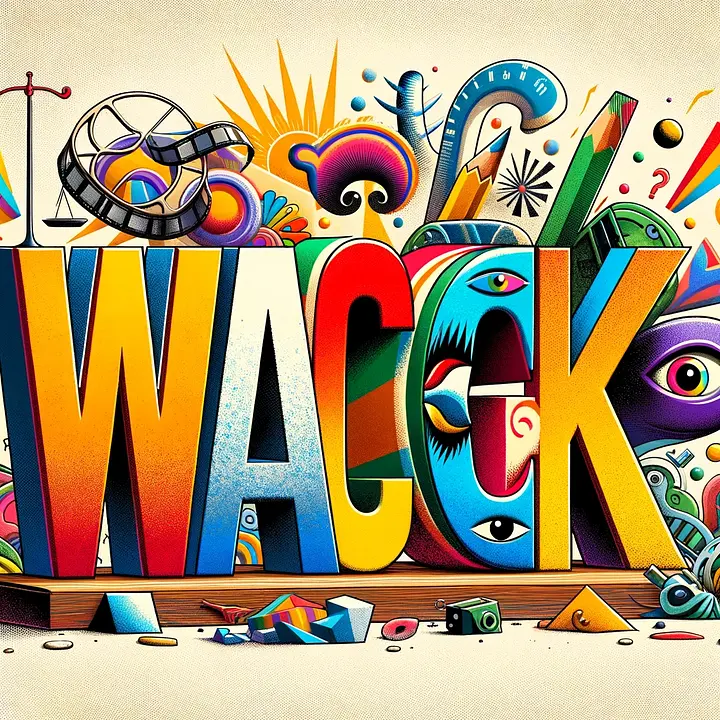Meaning of Wack
Wack is a slang term that has been in use for several decades now, particularly in African American Vernacular English (AAVE) and hip-hop culture. It describes something considered bad, wrong, weird, or not up to par.

The word wack often pops up in casual conversations, especially among younger generations, and is frequently heard in the realms of music and popular culture. But have you ever stopped to think about what this word really means and how it became a part of our everyday language? This blog post aims to explore the origins, evolution, and various dimensions of the word 'wack,' delving deep into its significance beyond just being a slang term.
Origins and Evolution of Wack
From Obscurity to Mainstream Slang
The journey of the word wack is a fascinating one. Originally emerging within African American Vernacular English (AAVE), wack has roots that are somewhat murky. Some linguists trace it back to the early 20th century, while others suggest it gained prominence in the 1980s with the rise of hip-hop culture. From its early use in the music industry, 'wack' has since spread into broader usage, becoming a staple in modern slang.
Linguistic Analysis: The Meaning Behind the Word
In linguistic terms, wack is primarily used as an adjective. It describes something that is unsatisfactory, lacking in quality, or simply not good. In this sense, the word is often used to express a subjective judgment on anything from music, fashion, ideas, to even people's behavior.
Wack in Popular Culture and Media
Hip-Hop and the Rise of Wack
The explosion of hip-hop culture in the 1980s and 1990s played a significant role in bringing wack into the mainstream vocabulary. In hip-hop, wack was often used to describe subpar lyrics, beats, or overall skill. This usage not only spread the word but also cemented its place in the cultural lexicon.
Beyond Music: Wack in Movies, TV Shows, and Social Media
As hip-hop culture permeated other forms of media, so did the word wack. It began appearing in movies, TV shows, and eventually social media platforms, where it was adopted by a diverse range of people to describe anything deemed inferior or not up to standard.
The Sociolinguistic Perspective
Wack as a Reflection of Social Attitudes
Words like wack do more than just convey a simple message; they reflect societal attitudes and trends. The popularity of wack mirrors a societal shift towards more informal, expressive forms of communication, particularly among youth. It also showcases the influence of African American culture and language on mainstream American English.
Regional Variations and Global Spread
While wack originated in the United States, it has since crossed borders, being used in various forms and contexts in other English-speaking countries. This global spread highlights the impact of American culture worldwide, particularly through music and entertainment.
Wack in the Digital Age: From Spoken Word to Online Jargon
In today's digital age, slang terms like wack transition seamlessly from spoken language to online communication. On social media platforms, wack is frequently used for comedic effect or to succinctly express disapproval. This online usage demonstrates the adaptability of slang and its ability to convey complex emotions and opinions in a concise manner.
The Psychological Implications of Wack
Expressing Disapproval and Identity Through Language
The use of wack is not just about expressing disapproval; it's also about identity. For many, especially in the younger generations, using words like wack is a way to identify with a particular cultural group or to distinguish oneself from mainstream or older generations.
The Power of Slang in Personal Expression
Slang provides individuals with a way to communicate more expressively and creatively. By using wack, people can convey a range of emotions and attitudes that might be harder to express with more traditional language. It’s a form of linguistic rebellion and innovation.
Conclusion
In summary, wack is a reflection of cultural, social, and linguistic evolution. From its roots in African American Vernacular English to its widespread use in various forms of media and everyday conversation, wack embodies the dynamic nature of language and its ability to adapt and change with society.
As language continues to evolve, words like wack remind us of the power of communication and its role in shaping our perceptions of the world. They highlight the importance of understanding the context and history behind the words we use, as well as their impact on our culture and identity. Whether you love it or think it's wack, there's no denying the significance of this unique word in the tapestry of modern language.
Published on
Updated on